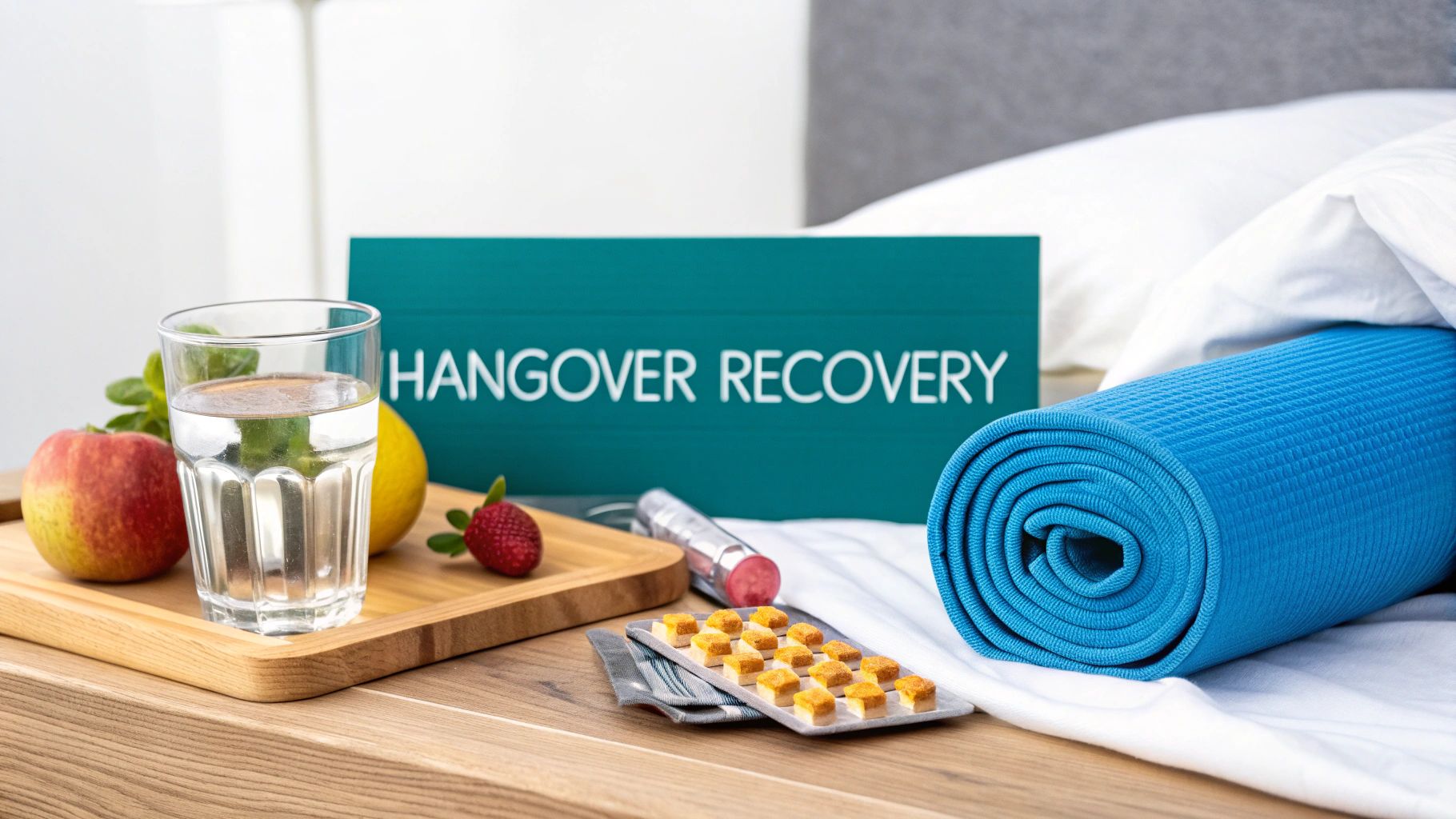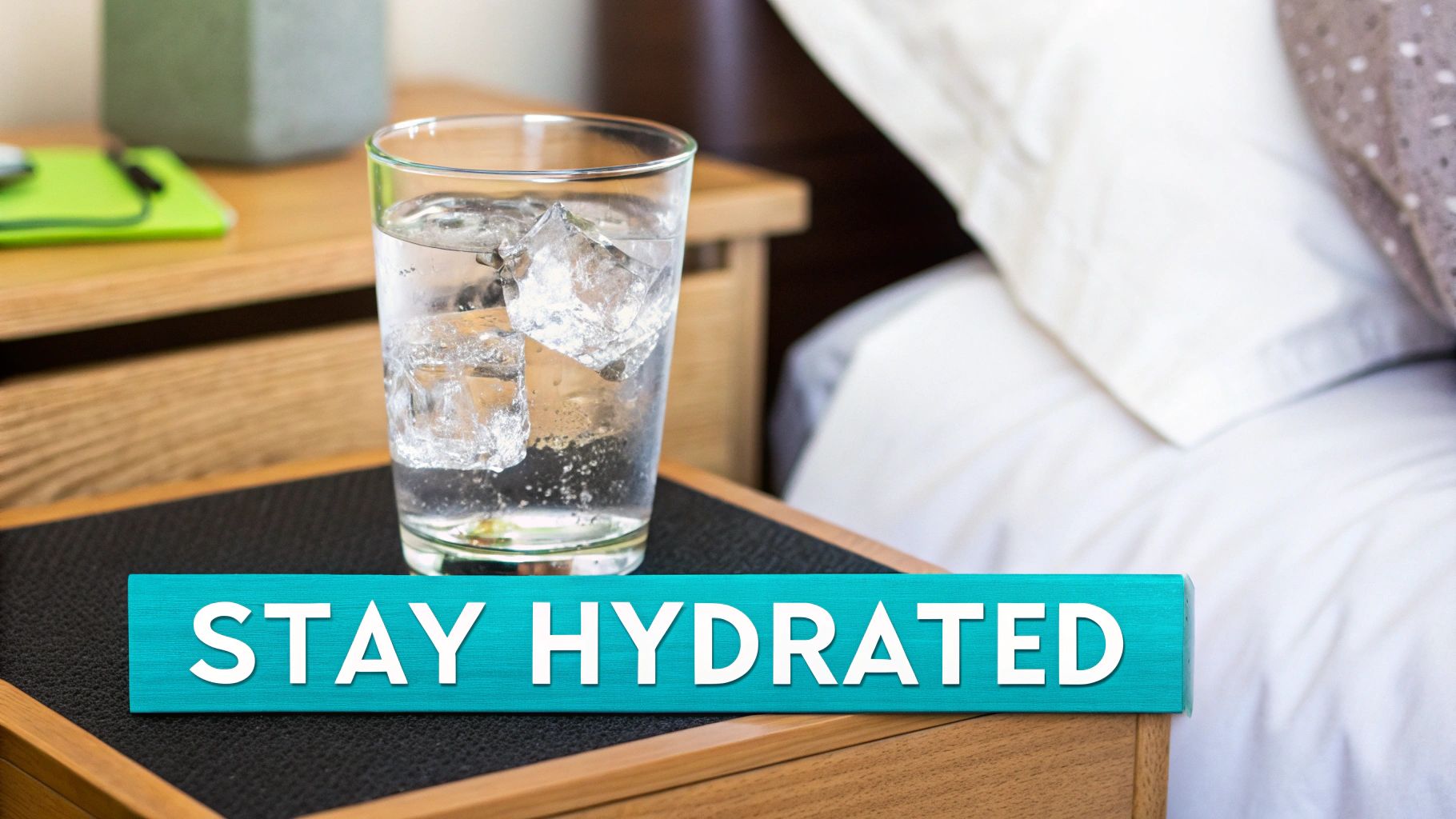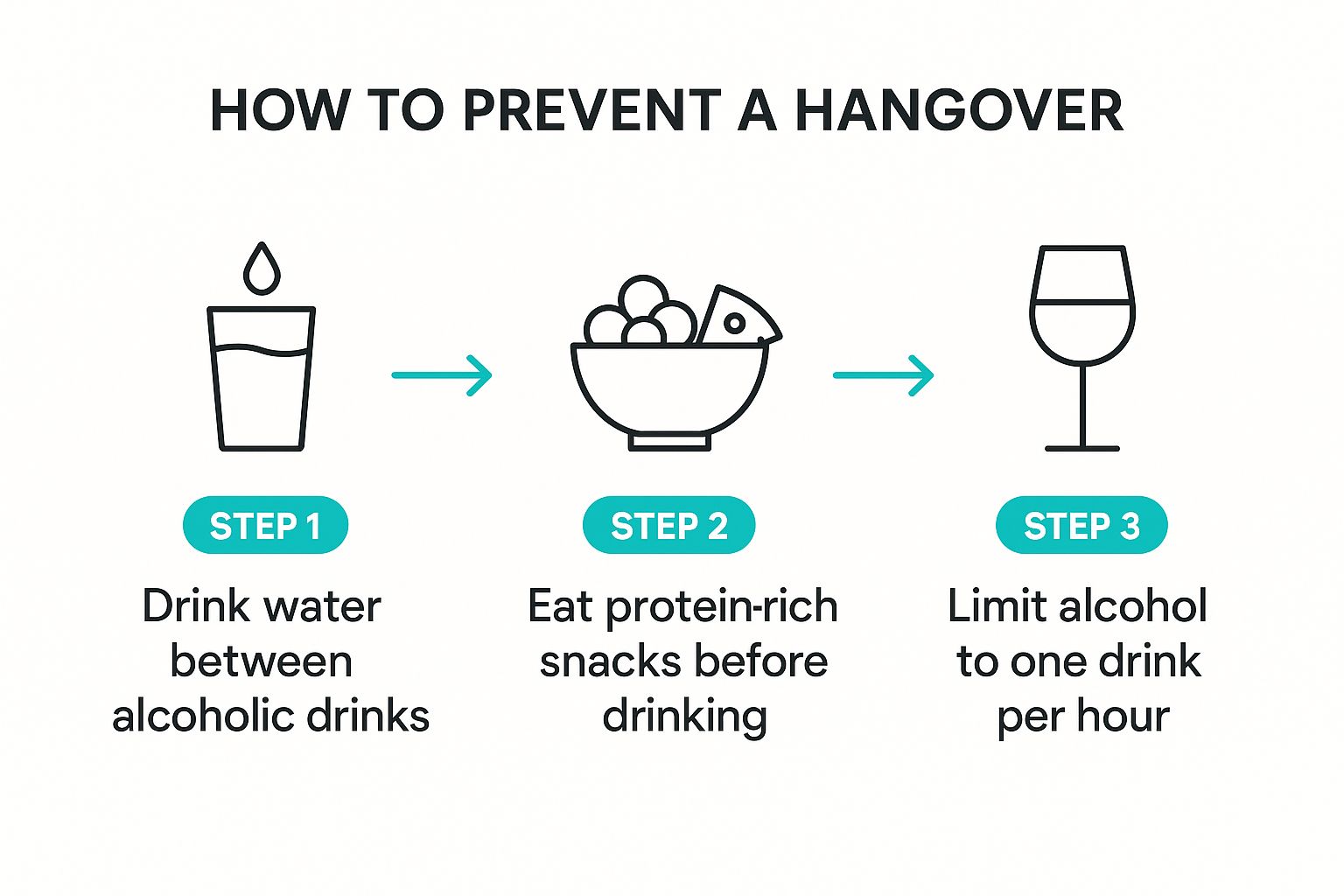

· By Annemarie
How to Recover After Drinking: Your Complete Recovery Guide
Why Your Body Feels Like It's Been Hit by a Truck
Let's be real: that feeling of being steamrolled by a freight train after a night of drinking isn't just your imagination. It's a full-on distress signal from your body. To figure out how to recover after drinking, you first have to understand what’s actually going on inside. It's not just one thing—it’s a perfect storm of issues hitting your system all at once.
The Science Behind the Suffering
At its core, alcohol is a toxin. The moment it hits your bloodstream, your body goes into defense mode on multiple fronts. Your liver starts working overtime to break it down, but this process creates a seriously nasty byproduct called acetaldehyde. This compound is the main villain behind your pounding headache and that wave of nausea. Believe it or not, it's far more responsible for that "I've been poisoned" feeling than the alcohol itself.
At the same time, alcohol is a diuretic, which is just a fancy way of saying it sends you to the bathroom—a lot. This leads to a major loss of fluids and electrolytes, which is why you wake up with a mouth as dry as the Sahara Desert and feel dizzy and exhausted. The dehydration can get so bad that it might even cause your brain to shrink temporarily, tugging on the membranes connecting it to your skull. The result? A headache that just won't quit. This combination of toxic overload and severe dehydration is a brutal one-two punch.
Why Sleep Doesn't Help
You’d think a solid eight hours of sleep would be the ultimate fix, but alcohol completely messes with your sleep quality. It blocks you from reaching the deep, restorative REM sleep your body desperately needs for mental and physical repair. This is the exact reason you can technically "sleep" for hours and still wake up feeling like you haven't rested at all. You can learn more about what causes hangovers in our in-depth guide.
This system-wide chaos is also why so many recovery products exist. Thoughtfully formulated hangover aids usually contain a blend of electrolytes, vitamins, and other compounds designed to tackle symptoms like nausea and fatigue. They work by helping to rehydrate your body, support your liver's detoxification process, and clear out those lingering toxic byproducts. To get a better sense of this growing market, you can learn more about the research behind hangover cure products.
Strategic Hydration That Goes Beyond Chugging Water

We've all been there. You wake up after a night out, and your first instinct is to find the biggest glass you own and chug water until you feel human again. While it feels like the right thing to do, effective recovery is about more than just refilling the tank; it's about restoring your body's delicate balance.
Alcohol has a diuretic effect, which means it doesn't just make you lose water—it also flushes out critical minerals known as electrolytes. These tiny powerhouses, like sodium, potassium, and magnesium, are basically the electrical grid for your body, controlling everything from muscle movement to how your nerves fire. Simply flooding your system with plain water can actually dilute the few electrolytes you have left, sometimes making you feel even worse. This is why a smarter approach to hydration is a must for anyone figuring out how to recover after drinking. The goal is to replace both fluids and the essential minerals you lost.
Building a Smarter Hydration Plan
A solid hydration strategy means choosing the right liquids at the right moments. Instead of mindlessly chugging water, think about incorporating fluids that do double duty. Things like sports drinks, coconut water, or even a simple glass of water with a pinch of salt and a squeeze of lemon can start restocking those lost electrolytes.
For a more direct and powerful approach, a targeted supplement like Upside Hangover Sticks gives your body a precise blend of electrolytes and other recovery aids. If you want to get really into the science of it, check out our guide on the best way to rehydrate after drinking.
To help you make the best choice for your own recovery, it’s useful to see how different hydration methods compare. Not all drinks work at the same speed or deliver the same benefits when you need them most.
Hydration Solutions Comparison
Here’s a quick breakdown to compare the effectiveness of different hydration methods for alcohol recovery.
| Hydration Method | Recovery Speed | Key Benefits | Best Timing |
|---|---|---|---|
| Plain Water | Slow | Accessible, zero calories, foundational | Throughout the day, between other options |
| Coconut Water | Moderate | Natural source of potassium and some electrolytes | Morning after, mid-day to sip on |
| Electrolyte Drinks | Fast | Balanced mineral replacement, targeted formula | Immediately upon waking, before bed if you remember |
| Fruit Juice | Moderate | Provides some vitamins, raises blood sugar | In the morning with a meal to avoid a sugar crash |
As you can see, while plain water has its place, it's not the fastest or most complete solution. Electrolyte drinks are specifically designed for rapid mineral replacement, making them a top-tier choice for bouncing back quickly. Coconut water and fruit juice are good natural options, but be mindful of their sugar content. Ultimately, a combination approach often works best to get you back on your feet.
Smart Food Choices That Actually Stay Down
 Once you've started rehydrating, the next hurdle is eating something—anything—that won’t make a quick return trip. When your stomach is doing gymnastics, the idea of a real meal can be horrifying. But choosing the right foods is a huge part of figuring out how to recover after drinking. The secret is picking things that are gentle on your system but also deliver the nutrients your body desperately needs.
Once you've started rehydrating, the next hurdle is eating something—anything—that won’t make a quick return trip. When your stomach is doing gymnastics, the idea of a real meal can be horrifying. But choosing the right foods is a huge part of figuring out how to recover after drinking. The secret is picking things that are gentle on your system but also deliver the nutrients your body desperately needs.
The last thing you want is anything heavy or greasy. That just gives your already overworked liver and digestive system more to deal with. Your real mission is to get your blood sugar back to a normal level and restock key vitamins without causing an internal crisis.
Gentle Foods for a Rebellious Stomach
My personal rule is to think simple and bland. You need calories for energy, but you don't want to make your stomach work hard for them.
- The BRAT Diet: This isn't just for kids with the flu. Bananas, rice, applesauce, and toast are classic for a reason. Bananas are a personal favorite because they're loaded with potassium, an electrolyte that alcohol flushes out of your system.
- Oatmeal or Crackers: These are complex carbs that help stabilize your blood sugar. You get a slow, steady stream of energy instead of the rollercoaster you'd get from a candy bar.
- Eggs: If you feel like you can handle something a bit more substantial, eggs are a lifesaver. They have an amino acid called cysteine that helps your body break down acetaldehyde, the nasty toxin that’s a major cause of your headache.
Supporting Your Liver Naturally
Beyond just getting calories in, many of us are looking for ways to give our liver a helping hand. This is why you see a growing interest in herbal products with ingredients like milk thistle and other plant extracts. The idea is that these natural compounds can help protect the liver as it works to metabolize toxins. This shift toward natural solutions shows how people are getting smarter about their post-party recovery. You can even read more about this trend in hangover cure products to see how recovery habits are changing.
The most important thing is to just listen to your body. Start with a few crackers or half a banana. If that feels okay after a while, maybe try something more nutrient-rich later. Trying to force down a big, “healthy” meal when you feel sick will almost certainly end badly. A gentle, strategic approach to food is always the best way to go.
Rest Strategies That Actually Let You Sleep
 It's a strange kind of punishment: your body is desperate for rest after a few drinks, but actually getting good, deep sleep feels impossible. You might pass out for a solid eight hours but wake up feeling like you’ve been in a wrestling match. This happens because alcohol messes with your sleep architecture, specifically preventing you from entering the deep, restorative REM sleep your brain uses for repair. Figuring out how to recover after drinking is really about learning to calm your overstimulated system so it can finally get some real rest.
It's a strange kind of punishment: your body is desperate for rest after a few drinks, but actually getting good, deep sleep feels impossible. You might pass out for a solid eight hours but wake up feeling like you’ve been in a wrestling match. This happens because alcohol messes with your sleep architecture, specifically preventing you from entering the deep, restorative REM sleep your brain uses for repair. Figuring out how to recover after drinking is really about learning to calm your overstimulated system so it can finally get some real rest.
Your brain and body are on high alert. While that first drink might feel relaxing, as your body processes the alcohol, your system goes into overdrive. This rebound is what leads to that choppy, unsatisfying sleep and often jolts you awake in the early morning hours. It’s a frustrating loop of being exhausted while being unable to find quality rest.
Optimizing Your Sleep Environment
Since your nervous system is already on edge, your bedroom needs to become a sanctuary. Think of it as running damage control for your senses. The mission is to remove anything that might interrupt your already fragile attempt at sleep.
- Go Completely Dark: Pull down the blackout curtains or slip on a comfortable sleep mask. Even a tiny bit of light from a charger or streetlamp can be enough to throw off your sleep cycle.
- Keep It Cool: A chilly room, somewhere around 65°F or 18°C, has been shown to signal to your body that it's time to shut down for the night.
- Block Out Noise: Right now, your brain is extra sensitive to every creak and whisper. A good pair of earplugs or a white noise machine can create a consistent soundscape, drowning out any sudden noises that might wake you.
Calming Your Restless Body and Mind
Once your room is set, it’s time to actively soothe your body. One of the simplest yet most effective things you can do is focus on your breathing. Try a simple box breathing exercise: breathe in for four seconds, hold your breath for four seconds, breathe out for four seconds, and hold again for four. Doing this for just a few minutes can slow your heart rate and quiet the post-alcohol anxiety that keeps your thoughts racing.
You might also want to pay attention to how you’re lying down. Sleeping on your left side can help with digestion and take some pressure off your internal organs—a small but welcome relief when your stomach feels a bit off. These tweaks won't magically undo the effects of a long night, but they create the best possible conditions for your body to start the important work of repairing itself.
Gentle Movement for Faster Healing
When you feel like you've been hit by a truck, exercise is probably the last thing on your to-do list. Just thinking about putting on workout clothes can feel like a monumental effort. But believe it or not, the right kind of movement can actually help you feel human again, faster. I’m not suggesting you hit the gym for a high-intensity session. Instead, think about gentle, strategic movements that help your body's healing process, not add more stress.
When you’re figuring out how to recover after drinking, effective movement is all about stimulating your body’s natural cleanup systems. Alcohol and its nasty byproducts, like acetaldehyde, can hang around long after the party ends. Light activity helps get your circulation going, which can help your body metabolize and clear out these lingering toxins more efficiently. It’s like giving your internal janitors a little push in the right direction.
Low-Impact Activities for Real Results
Instead of pushing through a run or a heavy lifting session, focus on activities that are more restorative. The idea is to get your body moving without draining your already low energy reserves.
- A Slow, Deliberate Walk: A short walk around the block can do wonders. The fresh air and a change of scenery can seriously improve your mood, while the gentle movement gets your blood flowing. It doesn't need to be a marathon—just 15-20 minutes is all you need.
- Gentle Stretching: Try some simple, full-body stretches. This can help ease the muscle stiffness and aches that often pop up from dehydration and a rough night of sleep. Just be sure to avoid any deep or intense stretches that might make you feel dizzy.
- Breathing Exercises: Deep, controlled breathing can work wonders to calm an overstimulated nervous system. Try a simple diaphragmatic breathing exercise: lie on your back, put one hand on your chest and the other on your stomach. Breathe in slowly through your nose, feeling your stomach rise. Then, exhale slowly through your mouth.
Pushing yourself too hard is the opposite of what you need. An intense workout can make dehydration worse and put even more stress on your body. If you start to feel dizzy, nauseous, or your headache gets worse, that’s your body screaming at you to stop and rest. You have to listen to it. A little movement goes a long way, but overdoing it will only push your recovery back.
Recovery Products and Supplements That Actually Work
When you’re trying to figure out how to recover after drinking, the sheer number of "hangover cures" on the market can be overwhelming. The supplement industry has exploded, and it’s no surprise. The global hangover cure market was valued at around $2.34 billion in 2023 and is expected to climb even higher. With so much money on the line, it's hard to tell what’s backed by science and what’s just clever marketing. You can explore the full breakdown of this growing market for recovery aids to see just how big it's become.
The trick is to cut through the noise and focus on ingredients that address the root causes of your misery: nutrient depletion, inflammation, and those awful toxic byproducts your body is fighting to clear out.
What to Look For in a Recovery Supplement
A truly effective product won't just mask the headache; it will actively help your body repair itself. This means looking for a formula that goes beyond a simple multivitamin. You need a targeted approach that understands what’s actually happening in your system.
Here's what a good formula should include:
- B-Complex Vitamins: Alcohol is notorious for draining your B vitamins, especially B1 (thiamine), B6, and B12. These are the building blocks for energy and clear thinking. Replenishing them can help you fight back against that crushing fatigue and brain fog.
- Dihydromyricetin (DHM): This is the star player. DHM is a natural extract from the Japanese raisin tree. Research suggests it helps your liver process alcohol more efficiently and can even reduce alcohol's impact on your brain's GABA receptors, which might be why you feel that next-day anxiety.
- Liver Support: Your liver does the heavy lifting after a night out. Ingredients like Milk Thistle and Prickly Pear are known for their anti-inflammatory and antioxidant properties, giving your liver the support it needs to clear toxins from your system.
To help you compare your options, we've put together a guide on some common recovery ingredients and how they stack up based on the science.
Recovery Supplement Effectiveness Guide
Evidence-based comparison of popular hangover recovery supplements and their proven benefits
| Supplement Type | Primary Benefits | Scientific Evidence | Recommended Timing |
|---|---|---|---|
| Dihydromyricetin (DHM) | Helps metabolize acetaldehyde, reduces inflammation, and lessens alcohol's effects on the brain. | Multiple studies show it can accelerate alcohol clearance and reduce hangover symptoms. | Before or immediately after drinking. |
| B-Complex Vitamins | Replenishes essential nutrients lost during drinking, supports energy production, and aids nerve function. | Well-established role in metabolism; depletion is linked to fatigue and cognitive issues. | Before, during, or after drinking. |
| Milk Thistle | Protects liver cells from damage, has strong antioxidant and anti-inflammatory properties. | Traditionally used for liver health; studies support its protective effects against toxins. | Before drinking to prepare the liver. |
| Prickly Pear Extract | Reduces inflammation and can alleviate symptoms like nausea and dry mouth. | A 2004 study found it significantly reduced hangover symptom severity. | A few hours before drinking. |
| Electrolytes | Rehydrates the body by restoring sodium, potassium, and magnesium levels. | Crucial for fluid balance; dehydration is a major contributor to hangover symptoms. | During and after drinking. |
This table shows that a combination of ingredients targeting different aspects of a hangover—from liver support to rehydration—is the most effective strategy.
A Smarter, All-in-One Solution
Instead of trying to piece together a routine with multiple pills and powders, a comprehensive product like Upside Hangover Sticks brings these key ingredients together in one easy-to-take jelly. It combines DHM, B-Vitamins, Milk Thistle, and other supportive nutrients into a single, targeted formula. This is the kind of strategic approach that makes a real difference in how you feel the next day. For more ideas, you can check out our guide on the top 7 best supplements for hangovers in 2025.
Timing is also a huge part of the equation. For the best results, you should take a recovery supplement before you go to sleep. This gives the ingredients a head start, allowing them to support your body’s natural detoxification processes while you rest. The goal is to wake up feeling much closer to 100%, not starting your recovery from zero.
Your Complete Recovery Action Plan
It's time to put all the pieces together into a game plan that actually works. Knowing why you feel so miserable is one thing, but having a clear strategy for how to recover after drinking is what will get you back on your feet. Think of this as your personal troubleshooting guide for the morning after, designed to take you from that first awful moment you open your eyes to feeling human again.
Creating Your Personal Recovery Timeline
Let's be real, recovery isn't a one-size-fits-all deal. It's more like a series of small, smart choices that add up. Your first move should be based on whatever symptom is hitting you the hardest. If you're fighting off waves of nausea, your focus should be on slowly sipping electrolyte-rich fluids and maybe nibbling on a few dry crackers. But if a splitting headache is the main problem, hydration and retreating to a quiet, dark room are your best first steps. Don't try to tackle everything at once.
A realistic game plan for the day might look something like this:
- The First Couple of Hours: Get some fluids in you with an electrolyte drink and take a targeted recovery supplement. Then, give your body a break by resting in a dark, quiet room.
- A Few Hours In: Once your stomach feels a bit more settled, try eating something simple. A banana or a piece of toast can work wonders to get your blood sugar back on track.
- Mid-Day: If you're feeling up to it, a short, slow walk outside can be a game-changer. The fresh air and gentle movement often do more good than you’d expect.
- Evening: Aim for a dinner that's packed with nutrients but still easy on your stomach. Steer clear of any more alcohol and make it a priority to wind down for an early night.
Of course, the best way to handle a rough morning is to prevent it from happening in the first place. This simple visual breaks down a few key strategies you can use before the night is even over.

This just goes to show that being proactive—like staying hydrated and eating properly while you're out—is your most effective tool for waking up without regrets.
Building Sustainable Habits
It's clear that people are tired of losing a day to feeling awful. The demand for effective recovery solutions is surging, with the global hangover cure market projected to reach $2.94 billion by 2025 and an estimated $5.16 billion by 2032. This isn’t just because people are partying more; it reflects a major shift toward more health-conscious recovery and a search for products that actually deliver. You can discover more insights about this growing market trend to see how consumer habits are evolving.
The smartest habit you can get into is being prepared. When you keep effective recovery aids on hand, you're ready to take action before the worst of the symptoms can even set in. Instead of just toughing it out, you can actively support your body’s healing process from the moment you get home.
Don’t let a great night out cost you your entire next day. It's time to stop suffering randomly and start using a systematic approach that gets you back to your life. For a simple, all-in-one solution that’s easy to stash in your pocket or purse, try Upside Hangover Sticks. Keep one with you and be ready for whatever the night brings. Learn more and get yours today at enjoyupside.com.
